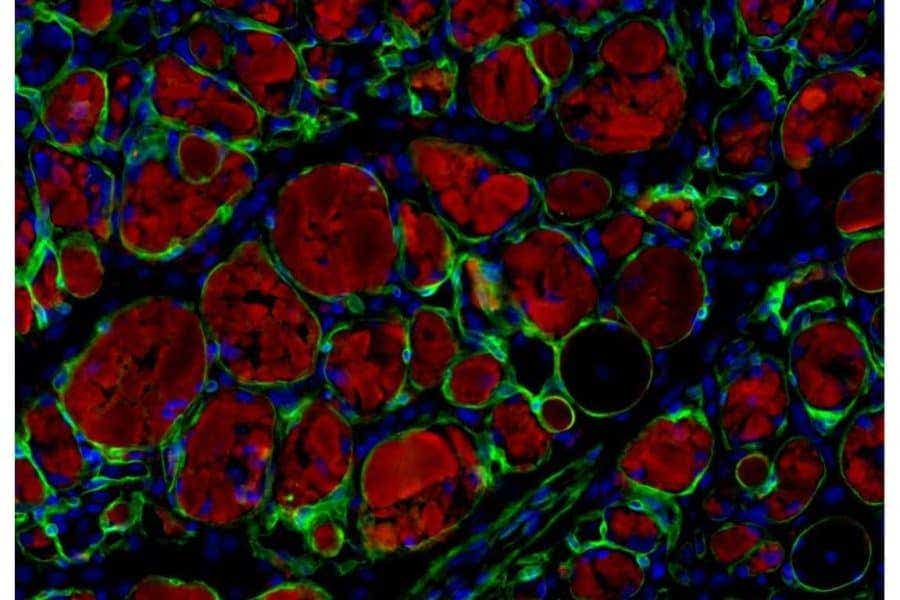Urine-derived stem cells have robust tissue regenerative potential
Researchers focused on how telomerase activity affects the regenerative potential of human urine and other types of stem cells.

[July 4, 2022: Bonnie Davis, Wake Forest Baptist Medical Center]
Cross section of human testicular cells 3D printed into a tubular structure. (CREDIT: Dr. Ryan Flannigan)
The Wake Forest Institute for Regenerative Medicine (WFIRM) researchers who were the first to identify that stem cells in human urine have potential for tissue regenerative effects, continue their investigation into the power of these cells. In their latest published study, they focus on how telomerase activity affects the regenerative potential of these and other types of stem cells.
Telomerase is an enzyme that is essential for the self-renewal and potential of different types of stem cells. Telomerase activity is also closely related to longevity. The research team investigated the regenerative significance of telomerase activity, particularly in terms of characteristic cell surface marker expression, multipotent differentiation capability, chromosomal stability, and safety of in vivo formation of tumors.
Their findings provide a novel perspective to evaluate the capacity of telomerase-positive human urine-derived stem cells to become a wide variety of other cell types, and to be used as an optimal cell source for stem cell therapy or cell-based tissue regeneration.
WFIRM’s Yuanyuan Zhang, Ph.D, lead author of the paper published by Frontiers in Cell and Developmental Biology, said that human urine-derived stem cells can be easily isolated from urine samples which offers clear advantages over stem cells from other sources, like bone marrow or fat tissue which often require a surgical procedure for collection.
Related Stories:
“Being able to use a patient's own stem cells for therapy is considered advantageous because they do not induce immune responses or rejection,” said WFIRM Director Anthony Atala, MD, who is a co-author of the paper. “Additionally, the non-invasive collection method is suitable for rapid clinical translation.”
The study demonstrates that human primary urinary stem cells with positive telomerase activity act as a distinct subpopulation with potential regeneration capacity in both cell growth and its capacity to become other cells, Zhang said. Better understanding of alterations in this cell subpopulation throughout the human lifespan, and how they translate into, aging, kidney damage, or cancer, among others will be beneficial overall.
“As a safe cell source, telomerase-positive human urine-derived stem cells have a robust regenerative potential, which might induce better tissue repair,” said Zhang.
Note: Materials provided above by Wake Forest Baptist Medical Center. Content may be edited for style and length.
Like these kind of feel good stories? Get the Brighter Side of News' newsletter.
Joshua Shavit
Science & Technology Writer | AI and Robotics Reporter
Joshua Shavit is a Los Angeles-based science and technology writer with a passion for exploring the breakthroughs shaping the future. As a contributor to The Brighter Side of News, he focuses on positive and transformative advancements in AI, technology, physics, engineering, robotics and space science. Joshua is currently working towards a Bachelor of Science in Business Administration at the University of California, Berkeley. He combines his academic background with a talent for storytelling, making complex scientific discoveries engaging and accessible. His work highlights the innovators behind the ideas, bringing readers closer to the people driving progress.



